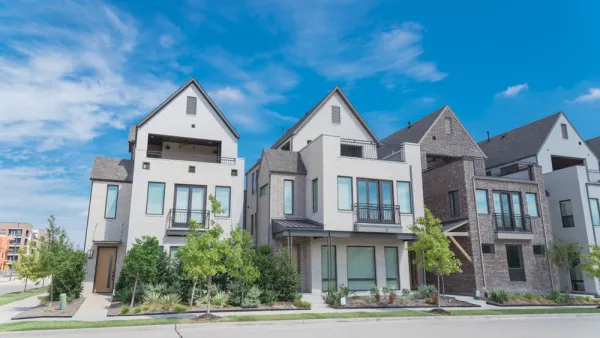Linking zoning reform mandates to CDBG funding is not an effective way to change exclusionary zoning.

Jenny Schuetz considers a strategy to address exclusionary zoning by putting provisions on grants to cities through the Community Development Block Grant (CDBG) program. The award of CDBG grants could require reform of regulations that hinder local development, says Schuetz.
“A statutory formula set by Congress determines the amount of funding for each locality, based on population size, poverty, housing age, and housing conditions. By design, larger and poorer communities receive more funds through the entitlement program,” notes Schuetz. For an exclusionary zoning reform mechanism to work, CDBG funds need to be a primary revenue source for a community receiving the funds directly from the Department of Housing and Urban Development (HUD).
Schuetz takes a closer look at exclusive cities, “defined as those with high rents and little rental or multifamily housing,” in California and New Jersey. Only 17 percent of these California cities receive CDBG funding, and no exclusive cities in New Jersey receive these funds. The California cities could be targets for zoning reform to encourage more affordable housing, says Schuetz:
However, low-income residents who are the intended beneficiaries of CDBG projects have little political influence over zoning decisions in affluent neighborhoods. Moreover, these cities are a small share of CDBG grantees. Undertaking the costly process of revising a federal regulation that affects thousands of communities in order to influence a handful of grantees is like performing brain surgery with a chainsaw.
Schuetz suggests alternative strategies HUD could pursue, including the HUD Secretary talking more directly about the need for zoning reform. “Explain how restrictive zoning harms not just low-income families but regional housing markets. Name and shame worst offenders, or applaud cities that have undertaken zoning reform. Provide direct guidance on what specific zoning practices should be changed.”
She also encourages HUD staff to use the wealth of data and analysis available to the agency and recommends that HUD bring together different stakeholders to come up with politically viable solutions.
FULL STORY: HUD can’t fix exclusionary zoning by withholding CDBG funds

Analysis: Cybertruck Fatality Rate Far Exceeds That of Ford Pinto
The Tesla Cybertruck was recalled seven times last year.

National Parks Layoffs Will Cause Communities to Lose Billions
Thousands of essential park workers were laid off this week, just before the busy spring break season.

Retro-silient?: America’s First “Eco-burb,” The Woodlands Turns 50
A master-planned community north of Houston offers lessons on green infrastructure and resilient design, but falls short of its founder’s lofty affordability and walkability goals.

Test News Post 1
This is a summary

Analysis: Cybertruck Fatality Rate Far Exceeds That of Ford Pinto
The Tesla Cybertruck was recalled seven times last year.

Test News Headline 46
Test for the image on the front page.
Urban Design for Planners 1: Software Tools
This six-course series explores essential urban design concepts using open source software and equips planners with the tools they need to participate fully in the urban design process.
Planning for Universal Design
Learn the tools for implementing Universal Design in planning regulations.
EMC Planning Group, Inc.
Planetizen
Planetizen
Mpact (formerly Rail~Volution)
Great Falls Development Authority, Inc.
HUDs Office of Policy Development and Research
NYU Wagner Graduate School of Public Service




























